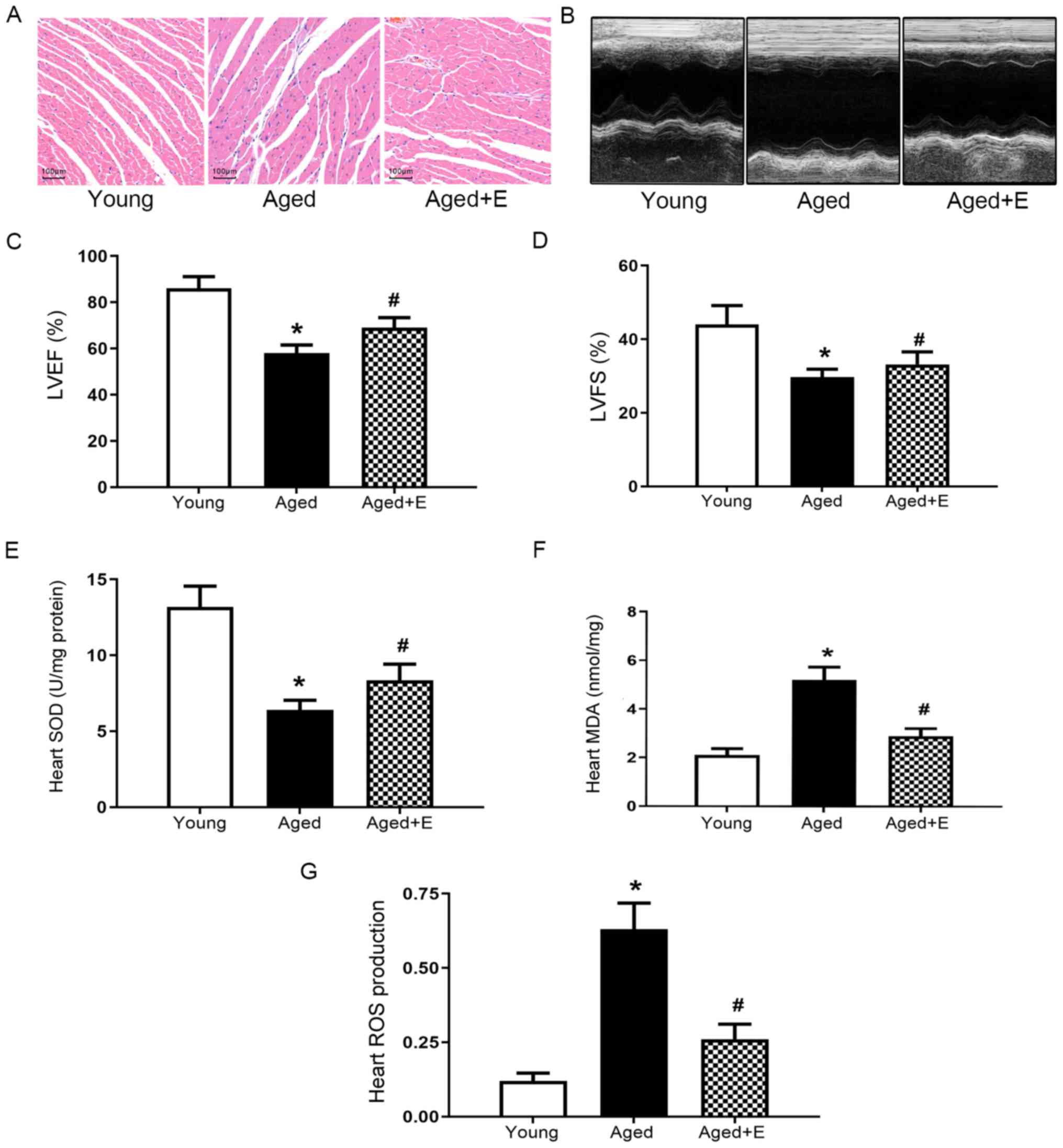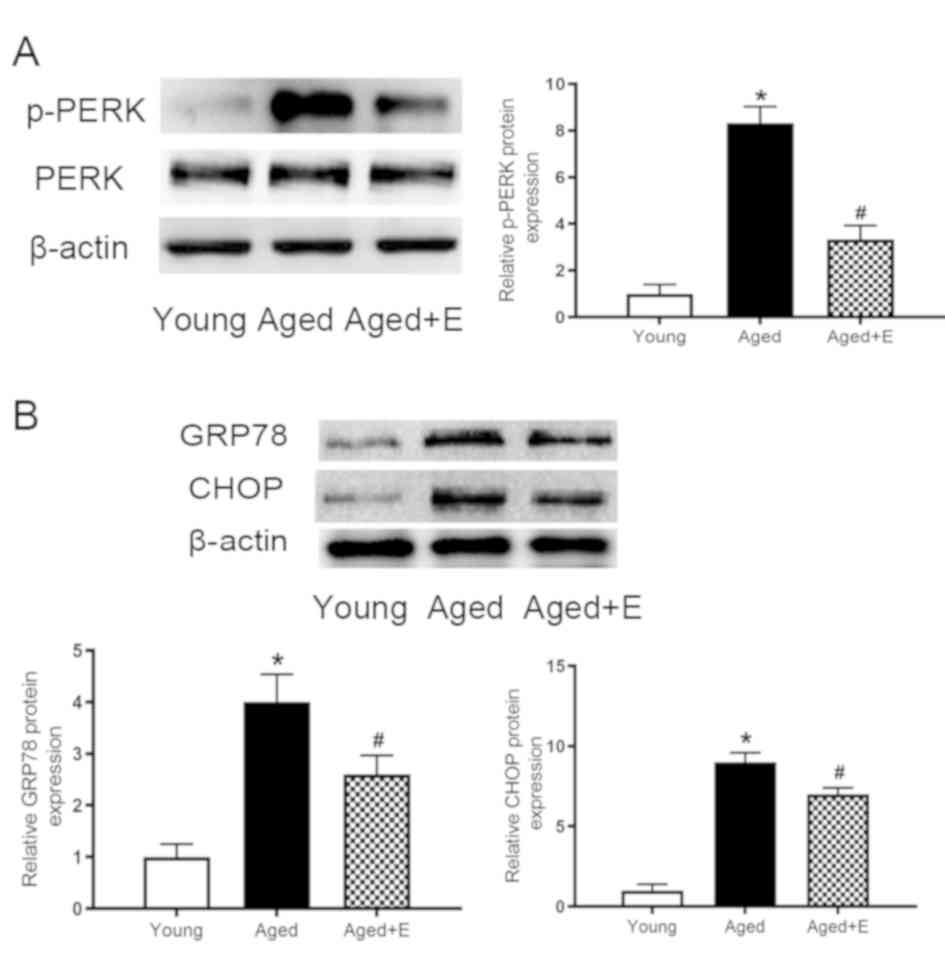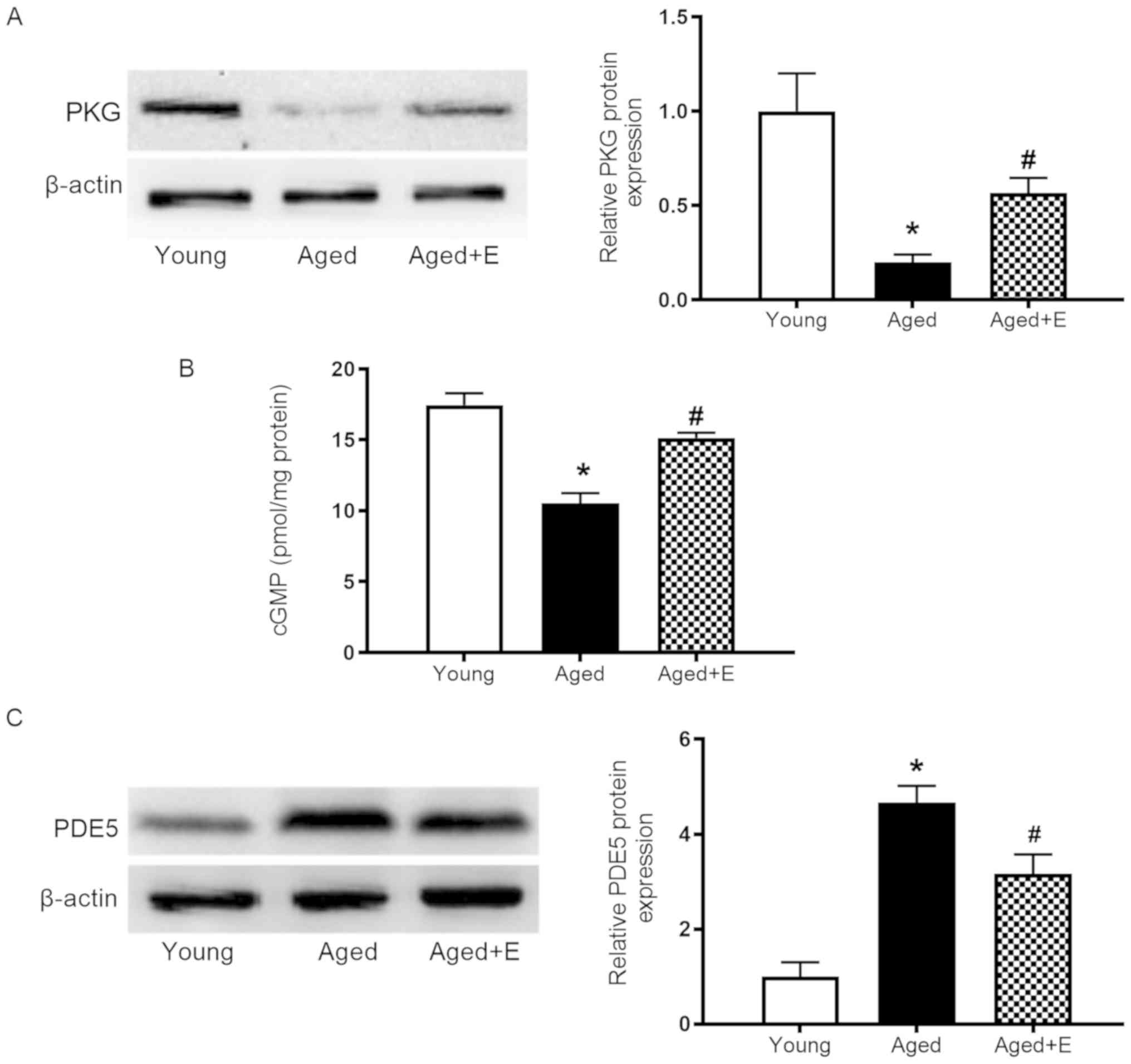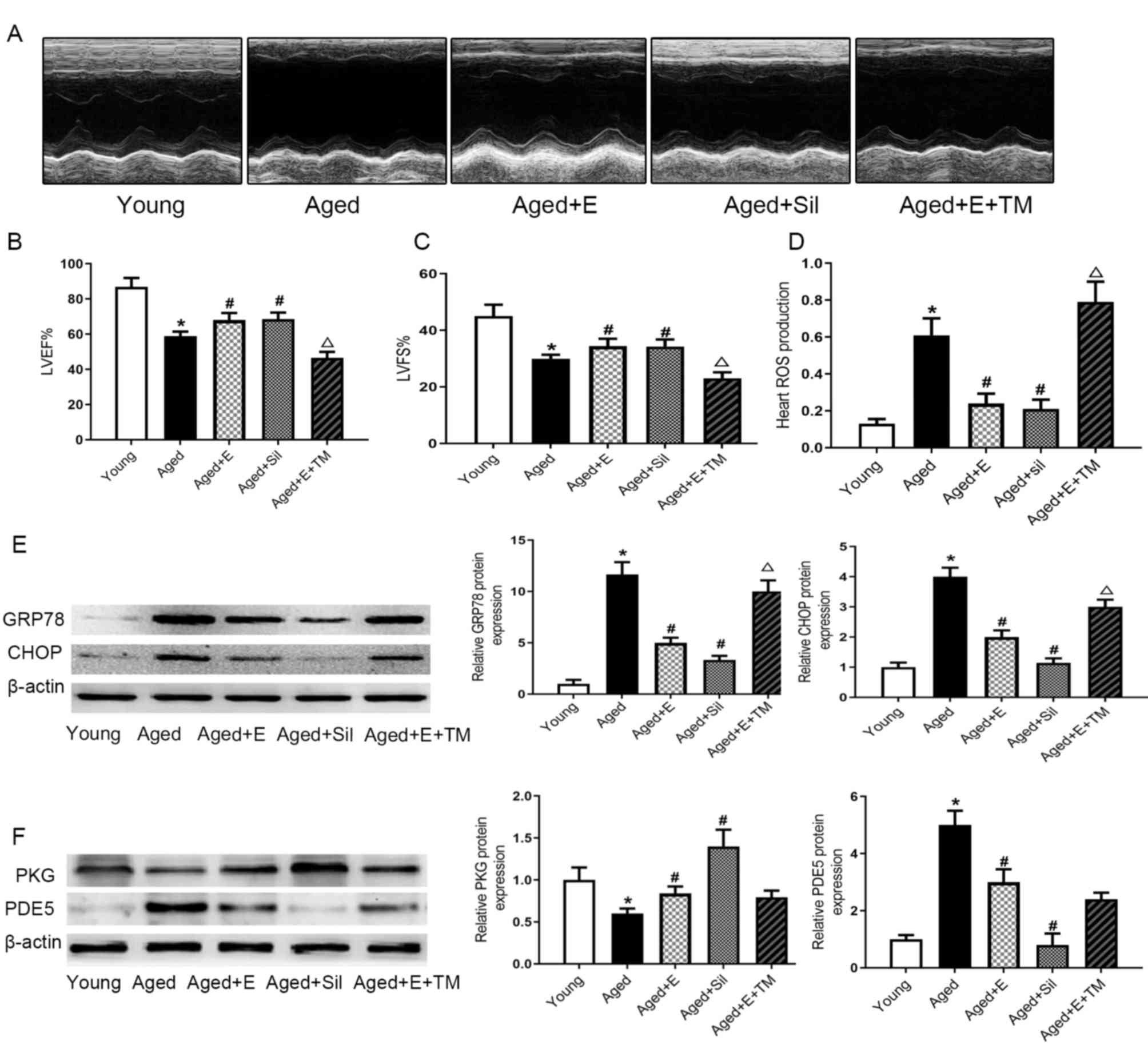|
1
|
Yang X, Sreejayan N and Ren J: Views from
within and beyond: Narratives of cardiac contractile dysfunction
under senescence. Endocrine. 26:127–137. 2005. View Article : Google Scholar : PubMed/NCBI
|
|
2
|
Wu J, Xia S, Kalionis B, Wan W and Sun T:
The role of oxidative stress and inflammation in cardiovascular
aging. Biomed Res Int. 2014:6153122014. View Article : Google Scholar : PubMed/NCBI
|
|
3
|
Lakatta EG and Levy D: Arterial and
cardiac aging: Major shareholders in cardiovascular disease
enterprises: Part II: The aging heart in health: Links to heart
disease. Circulation. 107:346–354. 2003. View Article : Google Scholar : PubMed/NCBI
|
|
4
|
Ozturk N, Olgar Y, Er H, Kucuk M and
Ozdemir S: Swimming exercise reverses aging-related contractile
abnormalities of female heart by improving structural alterations.
Cardiol J. 24:85–93. 2017. View Article : Google Scholar : PubMed/NCBI
|
|
5
|
Bachschmid MM, Schildknecht S, Matsui R,
Zee R, Haeussler D, Cohen RA, Pimental D and Loo B: Vascular aging:
Chronic oxidative stress and impairment of redox
signaling-consequences for vascular homeostasis and disease. Ann
Med. 45:17–36. 2013. View Article : Google Scholar : PubMed/NCBI
|
|
6
|
Belaya I, Suwa M, Chen T, Giniatullin R,
Kanninen KM, Atalay M and Kumagai S: Long-term exercise protects
against cellular stresses in aged mice. Oxid Med Cell Longev.
2018:28942472018. View Article : Google Scholar : PubMed/NCBI
|
|
7
|
Kim SR and Lee YC: Endoplasmic reticulum
stress and the related signaling networks in severe asthma. Allergy
Asthma Immunol Res. 7:106–117. 2015. View Article : Google Scholar : PubMed/NCBI
|
|
8
|
Lesnefsky EJ, Chen Q and Hoppel CL:
Mitochondrial metabolism in aging heart. Circ Res. 118:1593–1611.
2016. View Article : Google Scholar : PubMed/NCBI
|
|
9
|
da Luz G, Frederico MJ, da Silva S, Vitto
MF, Cesconetto PA, de Pinho RA, Pauli JR, Silva AS, Cintra DE,
Ropelle ER and De Souza CT: Endurance exercise training ameliorates
insulin resistance and reticulum stress in adipose and hepatic
tissue in obese rats. Eur J Appl Physiol. 111:2015–2023. 2011.
View Article : Google Scholar : PubMed/NCBI
|
|
10
|
Wang Y, Wang S, Wier WG, Zhang Q, Jiang H,
Li Q, Chen S, Tian Z, Li Y, Yu X, et al: Exercise improves the
dilatation function of mesenteric arteries in postmyocardial
infarction rats via a PI3K/Akt/eNOS pathway-mediated mechanism. Am
J Physiol Heart Circ Physiol. 299:H2097–H2106. 2010. View Article : Google Scholar : PubMed/NCBI
|
|
11
|
Zhang QJ, Li QX, Zhang HF, Zhang KR, Guo
WY, Wang HC, Zhou Z, Cheng HP, Ren J and Gao F: Swim training
sensitizes myocardial response to insulin: Role of Akt-dependent
eNOS activation. Cardiovasc Res. 75:369–380. 2007. View Article : Google Scholar : PubMed/NCBI
|
|
12
|
Puzzo D, Loreto C, Giunta S, Musumeci G,
Frasca G, Podda MV, Arancio O and Palmeri A: Effect of
phosphodiesterase-5 inhibition on apoptosis and beta amyloid load
in aged mice. Neurobiol Aging. 35:520–531. 2014. View Article : Google Scholar : PubMed/NCBI
|
|
13
|
Takimoto E, Champion HC, Li M, Belardi D,
Ren S, Rodriguez ER, Bedja D, Gabrielson KL, Wang Y and Kass DA:
Chronic inhibition of cyclic GMP phosphodiesterase 5A prevents and
reverses cardiac hypertrophy. Nat Med. 11:214–222. 2005. View Article : Google Scholar : PubMed/NCBI
|
|
14
|
Inserte J and Garcia-Dorado D: The
cGMP/PKG pathway as a common mediator of cardioprotection:
Translatability and mechanism. Br J Pharmacol. 172:1996–2009. 2015.
View Article : Google Scholar : PubMed/NCBI
|
|
15
|
Yu LM, Di WC, Dong X, Li Z, Zhang Y, Xue
XD, Xu YL, Zhang J, Xiao X, Han JS, et al: Melatonin protects
diabetic heart against ischemia-reperfusion injury, role of
membrane receptor-dependent cGMP-PKG activation. Biochim Biophys
Acta Mol Basis Dis. 1864:563–578. 2018. View Article : Google Scholar : PubMed/NCBI
|
|
16
|
Prola A, Pires Da Silva J, Guilbert A,
Lecru L, Piquereau J, Ribeiro M, Mateo P, Gressette M, Fortin D,
Boursier C, et al: SIRT1 protects the heart from ER stress-induced
cell death through eIF2α deacetylation. Cell Death Differ.
24:343–356. 2017. View Article : Google Scholar : PubMed/NCBI
|
|
17
|
Chang P, Zhang M, Zhang X, Li G, Hu H, Wu
J, Wang X, Yang Z, Zhang J, Chen W, et al: B-type natriuretic
peptide attenuates endoplasmic reticulum stress in H9c2
cardiomyocytes underwent hypoxia/reoxygenation injury under high
glucose/high fat conditions. Peptides. 111:103–111. 2019.
View Article : Google Scholar : PubMed/NCBI
|
|
18
|
Malhotra JD and Kaufman RJ: Endoplasmic
reticulum stress and oxidative stress: A vicious cycle or a
double-edged sword? Antioxid Redox Signal. 9:2277–2293. 2007.
View Article : Google Scholar : PubMed/NCBI
|
|
19
|
Zhang Y, Wang C, Zhou J, Sun A,
Hueckstaedt LK, Ge J and Ren J: Complex inhibition of autophagy by
mitochondrial aldehyde dehydrogenase shortens lifespan and
exacerbates cardiac aging. Biochim Biophys Acta Mol Basis Dis.
1863:1919–1932. 2017. View Article : Google Scholar : PubMed/NCBI
|
|
20
|
Gambino V, De Michele G, Venezia O,
Migliaccio P, Dall'Olio V, Bernard L, Minardi SP, Della Fazia MA,
Bartoli D, Servillo G, et al: Oxidative stress activates a specific
p53 transcriptional response that regulates cellular senescence and
aging. Aging Cell. 12:435–445. 2013. View Article : Google Scholar : PubMed/NCBI
|
|
21
|
Vigneron A and Vousden KH: p53, ROS and
senescence in the control of aging. Aging (Albany NY). 2:471–474.
2010. View Article : Google Scholar : PubMed/NCBI
|
|
22
|
Sikka SC and Hellstrom WJ: Role of
oxidative stress and antioxidants in Peyronie's disease. Int J
Impot Res. 14:353–360. 2002. View Article : Google Scholar : PubMed/NCBI
|
|
23
|
Amin MM, Rafiei N, Poursafa P, Ebrahimpour
K, Mozafarian N, Shoshtari-Yeganeh B, Hashemi M and Kelishadi R:
Association of benzene exposure with insulin resistance, SOD, and
MDA as markers of oxidative stress in children and adolescents.
Environ Sci Pollut Res Int. 25:34046–34052. 2018. View Article : Google Scholar : PubMed/NCBI
|
|
24
|
Golbidi S and Laher I: Exercise and the
cardiovascular system. Cardiol Res Pract. 2012:2108522012.
View Article : Google Scholar : PubMed/NCBI
|
|
25
|
Zhao H, Liu J, Pan S, Sun Y, Li Q, Li F,
Ma L and Guo Q: SOD mRNA and MDA expression in rectus femoris
muscle of rats with different eccentric exercise programs and time
points. PLoS One. 8:e736342013. View Article : Google Scholar : PubMed/NCBI
|
|
26
|
Cui W, Li J, Ron D and Sha B: The
structure of the PERK kinase domain suggests the mechanism for its
activation. Acta Crystallogr D Biol Crystallogr. 67:423–428. 2011.
View Article : Google Scholar : PubMed/NCBI
|
|
27
|
Sanderson TH, Deogracias MP, Nangia KK,
Wang J, Krause GS and Kumar R: PKR-like endoplasmic reticulum
kinase (PERK) activation following brain ischemia is independent of
unfolded nascent proteins. Neuroscience. 169:1307–1314. 2010.
View Article : Google Scholar : PubMed/NCBI
|
|
28
|
Delbrel E, Soumare A, Naguez A, Label R,
Bernard O, Bruhat A, Fafournoux P, Tremblais G, Marchant D, Gille
T, et al: HIF-1α triggers ER stress and CHOP-mediated apoptosis in
alveolar epithelial cells, a key event in pulmonary fibrosis. Sci
Rep. 8:179392018. View Article : Google Scholar : PubMed/NCBI
|
|
29
|
Ikeyama S, Wang XT, Li J, Podlutsky A,
Martindale JL, Kokkonen G, van Huizen R, Gorospe M and Holbrook NJ:
Expression of the pro-apoptotic gene gadd153/chop is elevated in
liver with aging and sensitizes cells to oxidant injury. J Biol
Chem. 278:16726–16731. 2003. View Article : Google Scholar : PubMed/NCBI
|
|
30
|
Breivik L, Jensen A, Guvåg S, Aarnes EK,
Aspevik A, Helgeland E, Hovland S, Brattelid T and Jonassen AK:
B-type natriuretic peptide expression and cardioprotection is
regulated by Akt dependent signaling at early reperfusion.
Peptides. 66:43–50. 2015. View Article : Google Scholar : PubMed/NCBI
|
|
31
|
Lin CS, Liu X, Tu R, Chow S and Lue TF:
Age-related decrease of protein kinase G activation in vascular
smooth muscle cells. Biochem Biophys Res Commun. 287:244–248. 2001.
View Article : Google Scholar : PubMed/NCBI
|
|
32
|
Cui R, Iso H, Yamagishi K, Ohira T,
Tanigawa T, Kitamura A, Kiyama M, Imano H, Konishi M and Shimamoto
T: Relationship of urinary cGMP excretion with aging and menopausal
status in a general population. J Atheroscler Thromb. 16:457–462.
2009. View Article : Google Scholar : PubMed/NCBI
|
|
33
|
Mátyás C, Németh BT, Oláh A, Török M,
Ruppert M, Kellermayer D, Barta BA, Szabó G, Kökény G, Horváth EM,
et al: Prevention of the development of heart failure with
preserved ejection fraction by the phosphodiesterase-5A inhibitor
vardenafil in rats with type 2 diabetes. Eur J Heart Fail.
19:326–336. 2017. View Article : Google Scholar : PubMed/NCBI
|
|
34
|
Wang L, Chopp M, Szalad A, Liu Z, Bolz M,
Alvarez FM, Lu M, Zhang L, Cui Y, Zhang RL and Zhang ZG:
Phosphodiesterase-5 is a therapeutic target for peripheral
neuropathy in diabetic mice. Neuroscience. 193:399–410. 2011.
View Article : Google Scholar : PubMed/NCBI
|
|
35
|
Zhang M and Kass DA: Phosphodiesterases
and cardiac cGMP: Evolving roles and controversies. Trends
Pharmacol Sci. 32:360–365. 2011. View Article : Google Scholar : PubMed/NCBI
|
|
36
|
Cheitlin MD, Hutter AM Jr, Brindis RG,
Ganz P, Kaul S, Russell RO Jr and Zusman RM: ACC/AHA expert
consensus document. Use of sildenafil (Viagra) in patients with
cardiovascular disease. American College of Cardiology/American
Heart Association. J Am Coll Cardiol. 33:273–282. 1999. View Article : Google Scholar : PubMed/NCBI
|
|
37
|
Rashid M, Kotwani A and Fahim M:
Long-acting phosphodiesterase 5 inhibitor, tadalafil, and
superoxide dismutase mimetic, tempol, protect against acute
hypoxia-induced pulmonary hypertension in rats. Hum Exp Toxicol.
31:626–636. 2012. View Article : Google Scholar : PubMed/NCBI
|
|
38
|
Lu Z, Xu X, Hu X, Lee S, Traverse JH, Zhu
G, Fassett J, Tao Y, Zhang P, dos Remedios C, et al: Oxidative
stress regulates left ventricular PDE5 expression in the failing
heart. Circulation. 121:1474–1483. 2010. View Article : Google Scholar : PubMed/NCBI
|
|
39
|
Kukreja RC, Salloum FN and Das A: Cyclic
guanosine monophosphate signaling and phosphodiesterase-5
inhibitors in cardioprotection. J Am Coll Cardiol. 59:1921–1927.
2012. View Article : Google Scholar : PubMed/NCBI
|
|
40
|
Zhang C, Syed TW, Liu R and Yu J: Role of
endoplasmic reticulum stress, autophagy, and inflammation in
cardiovascular disease. Front Cardiovasc Med. 4:292017. View Article : Google Scholar : PubMed/NCBI
|
|
41
|
Gong W, Duan Q, Cai Z, Chen C, Ni L, Yan
M, Wang X, Cianflone K and Wang DW: Chronic inhibition of
cGMP-specific phosphodiesterase 5 suppresses endoplasmic reticulum
stress in heart failure. Br J Pharmacol. 170:1396–1409. 2013.
View Article : Google Scholar : PubMed/NCBI
|


















